Unit 1 Where did you go on vacation单元要点精析+习题精炼(有答案)
文档属性
| 名称 | Unit 1 Where did you go on vacation单元要点精析+习题精炼(有答案) |
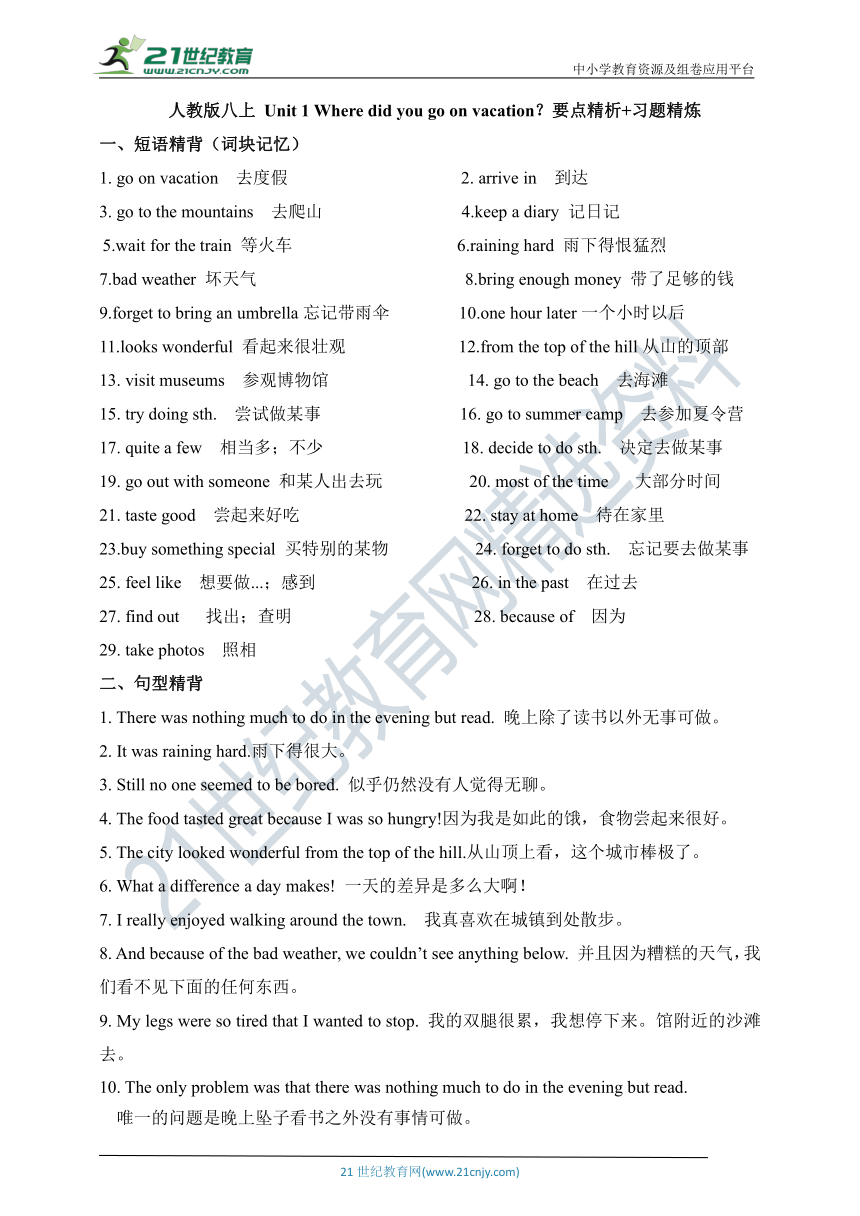
|
|
| 格式 | zip | ||
| 文件大小 | 1.2MB | ||
| 资源类型 | 试卷 | ||
| 版本资源 | 人教新目标(Go for it)版 | ||
| 科目 | 英语 | ||
| 更新时间 | 2020-09-18 19:42:08 | ||
图片预览

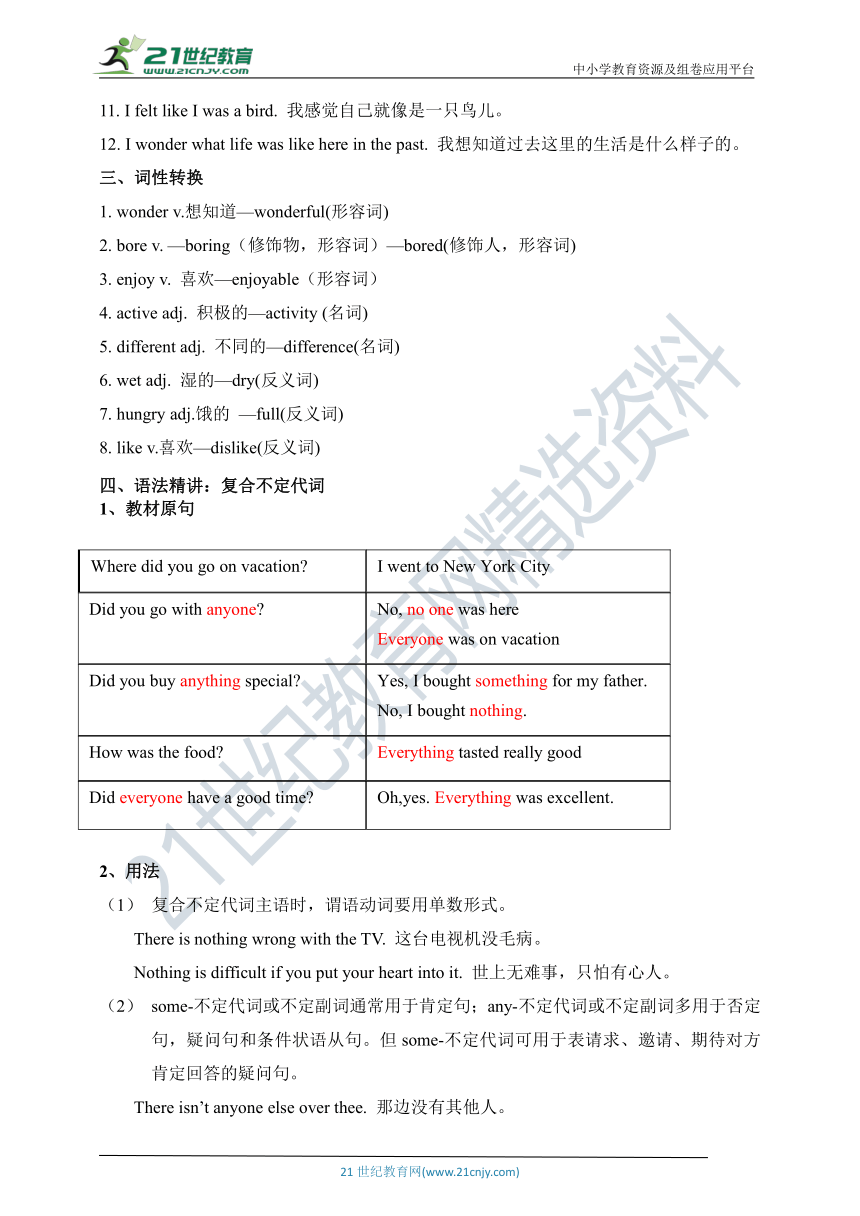
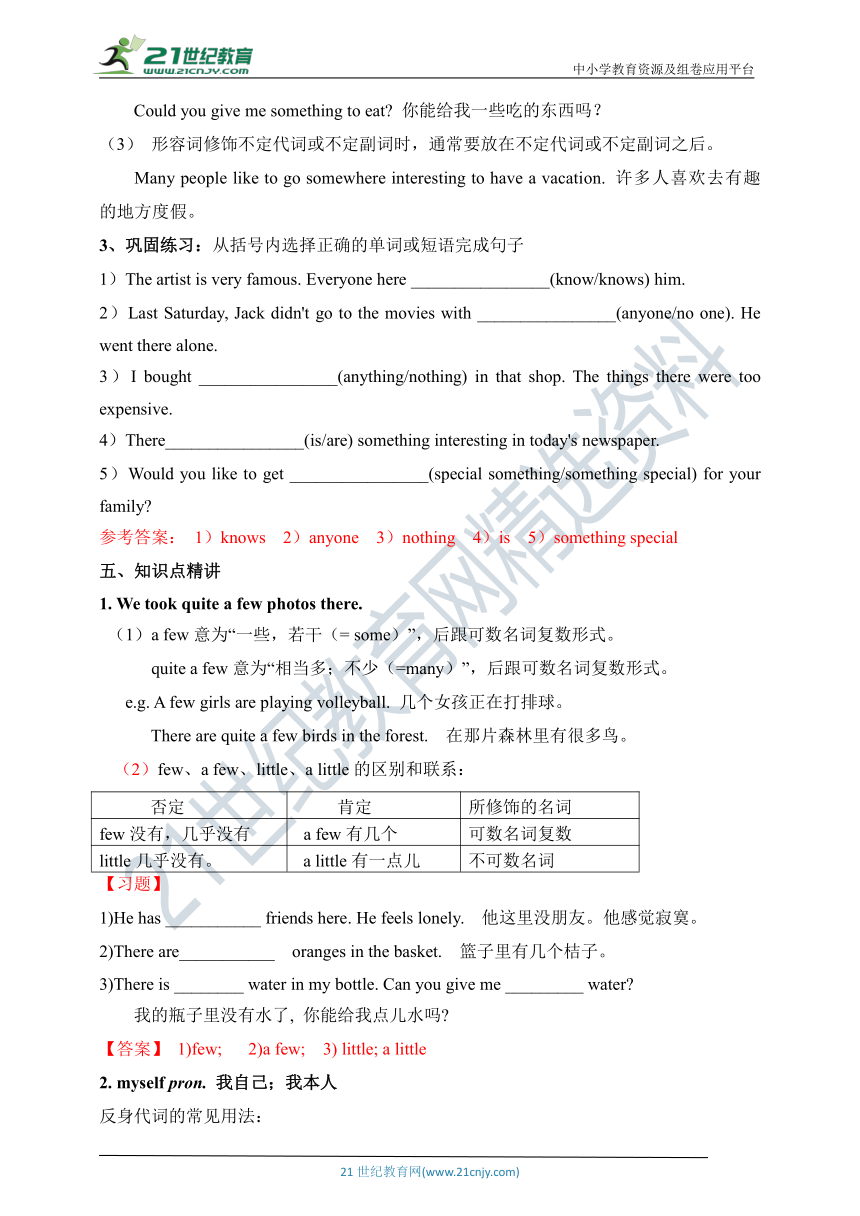
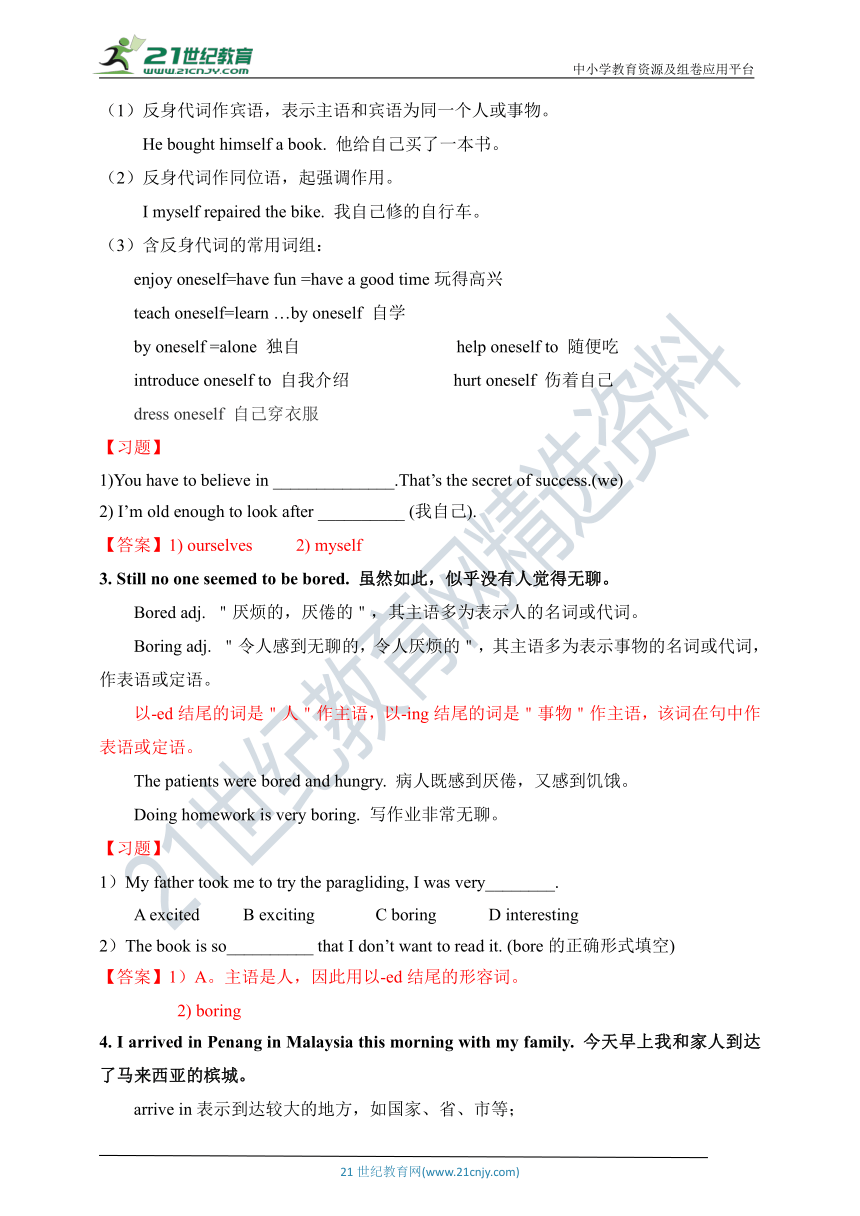
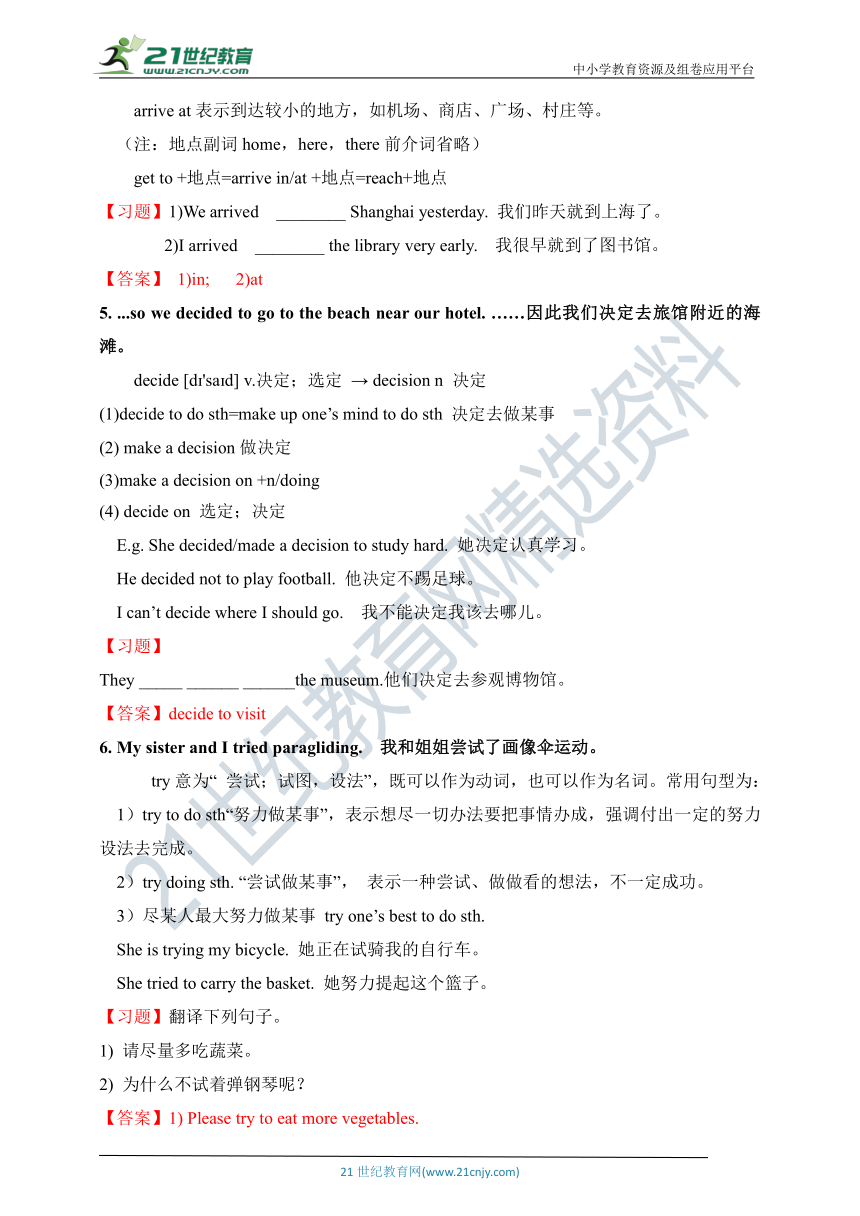
文档简介
中小学教育资源及组卷应用平台
人教版八上
Unit
1
Where
did
you
go
on
vacation?要点精析+习题精炼
一、短语精背(词块记忆)
1.
go
on
vacation
去度假
2.
arrive
in
到达
3.
go
to
the
mountains
去爬山
4.keep
a
diary
记日记
5.wait
for
the
train
等火车
6.raining
hard
雨下得恨猛烈
7.bad
weather
坏天气
8.bring
enough
money
带了足够的钱
9.forget
to
bring
an
umbrella忘记带雨伞
10.one
hour
later一个小时以后
11.looks
wonderful
看起来很壮观
12.from
the
top
of
the
hill从山的顶部
13.
visit
museums
参观博物馆
14.
go
to
the
beach
去海滩
15.
try
doing
sth.
尝试做某事
16.
go
to
summer
camp
去参加夏令营
17.
quite
a
few
相当多;不少
18.
decide
to
do
sth.
决定去做某事
19.
go
out
with
someone
和某人出去玩
20.
most
of
the
time
大部分时间
21.
taste
good
尝起来好吃
22.
stay
at
home
待在家里
23.buy
something
special
买特别的某物
24.
forget
to
do
sth.
忘记要去做某事
25.
feel
like
想要做...;感到
26.
in
the
past
在过去
27.
find
out
找出;查明
28.
because
of
因为
29.
take
photos
照相
二、句型精背
1.
There
was
nothing
much
to
do
in
the
evening
but
read.
晚上除了读书以外无事可做。
2.
It
was
raining
hard.雨下得很大。
3.
Still
no
one
seemed
to
be
bored.
似乎仍然没有人觉得无聊。
4.
The
food
tasted
great
because
I
was
so
hungry!因为我是如此的饿,食物尝起来很好。
5.
The
city
looked
wonderful
from
the
top
of
the
hill.从山顶上看,这个城市棒极了。
6.
What
a
difference
a
day
makes!
一天的差异是多么大啊!
7.
I
really
enjoyed
walking
around
the
town.
我真喜欢在城镇到处散步。
8.
And
because
of
the
bad
weather,
we
couldn’t
see
anything
below.
并且因为糟糕的天气,我们看不见下面的任何东西。
9.
My
legs
were
so
tired
that
I
wanted
to
stop.
我的双腿很累,我想停下来。馆附近的沙滩去。
10.
The
only
problem
was
that
there
was
nothing
much
to
do
in
the
evening
but
read.
唯一的问题是晚上坠子看书之外没有事情可做。
11.
I
felt
like
I
was
a
bird.
我感觉自己就像是一只鸟儿。
12.
I
wonder
what
life
was
like
here
in
the
past.
我想知道过去这里的生活是什么样子的。
三、词性转换
1.
wonder
v.想知道—wonderful(形容词)
2.
bore
v.
—boring(修饰物,形容词)—bored(修饰人,形容词)
3.
enjoy
v.
喜欢—enjoyable(形容词)
4.
active
adj.
积极的—activity
(名词)
5.
different
adj.
不同的—difference(名词)
6.
wet
adj.
湿的—dry(反义词)
7.
hungry
adj.饿的
?—full(反义词)
8.
like
v.喜欢—dislike(反义词)
四、语法精讲:复合不定代词
1、教材原句
Where?did?you?go?on?vacation?
I?went?to?New?York?City
Did?you?go?with?anyone?
No,?no?one?was?hereEveryone?was?on?vacation
Did?you?buy?anything?special?
Yes,?I?bought?something?for?my?father.No,?I?bought?nothing.
How?was?the?food?
Everything?tasted?really?good
Did?everyone?have?a?good?time?
Oh,yes.?Everything?was?excellent.
2、用法
复合不定代词主语时,谓语动词要用单数形式。
There
is
nothing
wrong
with
the
TV.
这台电视机没毛病。
Nothing
is
difficult
if
you
put
your
heart
into
it.
世上无难事,只怕有心人。
some-不定代词或不定副词通常用于肯定句;any-不定代词或不定副词多用于否定句,疑问句和条件状语从句。但some-不定代词可用于表请求、邀请、期待对方肯定回答的疑问句。
There
isn’t
anyone
else
over
thee.
那边没有其他人。
Could
you
give
me
something
to
eat?
你能给我一些吃的东西吗?
形容词修饰不定代词或不定副词时,通常要放在不定代词或不定副词之后。
Many
people
like
to
go
somewhere
interesting
to
have
a
vacation.
许多人喜欢去有趣的地方度假。
3、巩固练习:从括号内选择正确的单词或短语完成句子
1)The
artist
is
very
famous.
Everyone
here
________________(know/knows)
him.
2)Last
Saturday,
Jack
didn't
go
to
the
movies
with
________________(anyone/no
one).
He
went
there
alone.
3)I
bought
________________(anything/nothing)
in
that
shop.
The
things
there
were
too
expensive.
4)There________________(is/are)
something
interesting
in
today's
newspaper.
5)Would
you
like
to
get
________________(special
something/something
special)
for
your
family?
参考答案:
1)knows 2)anyone 3)nothing 4)is 5)something
special
五、知识点精讲
1.
We
took
quite
a
few
photos
there.
(1)a
few意为“一些,若干(=
some)”,后跟可数名词复数形式。
quite
a
few意为“相当多;不少(=many)”,后跟可数名词复数形式。
e.g.
A
few
girls
are
playing
volleyball.
几个女孩正在打排球。
There
are
quite
a
few
birds
in
the
forest.
在那片森林里有很多鸟。
few、a
few、little、a
little的区别和联系:
否定
肯定
所修饰的名词
few没有,几乎没有
a
few有几个
可数名词复数
little几乎没有。
a
little有一点儿
不可数名词
【习题】
1)He
has
___________
friends
here.
He
feels
lonely.
他这里没朋友。他感觉寂寞。
2)There
are___________
oranges
in
the
basket.
篮子里有几个桔子。
3)There
is
________
water
in
my
bottle.
Can
you
give
me
_________
water?
我的瓶子里没有水了,
你能给我点儿水吗?
【答案】
1)few;
2)a
few;
3)
little;
a
little
2.
myself
pron.
我自己;我本人
反身代词的常见用法:
(1)反身代词作宾语,表示主语和宾语为同一个人或事物。
He
bought
himself
a
book.
他给自己买了一本书。
(2)反身代词作同位语,起强调作用。
I
myself
repaired
the
bike.
我自己修的自行车。
(3)含反身代词的常用词组:
enjoy
oneself=have
fun
=have
a
good
time玩得高兴
teach
oneself=learn
…by
oneself
自学
by
oneself
=alone
独自
help
oneself
to
随便吃
introduce
oneself
to
自我介绍
hurt
oneself
伤着自己
dress
oneself
自己穿衣服
【习题】
1)You
have
to
believe
in
______________.That’s
the
secret
of
success.(we)
2)
I’m
old
enough
to
look
after
__________
(我自己).
【答案】1)
ourselves
2)
myself
3.
Still
no
one
seemed
to
be
bored.
虽然如此,似乎没有人觉得无聊。
Bored
adj.
"厌烦的,厌倦的",其主语多为表示人的名词或代词。
Boring
adj.
"令人感到无聊的,令人厌烦的",其主语多为表示事物的名词或代词,作表语或定语。
以-ed结尾的词是"人"作主语,以-ing结尾的词是"事物"作主语,该词在句中作表语或定语。
The
patients
were
bored
and
hungry.
病人既感到厌倦,又感到饥饿。
Doing
homework
is
very
boring.
写作业非常无聊。
【习题】
1)My
father
took
me
to
try
the
paragliding,
I
was
very________.
A
excited
B
exciting
C
boring
D
interesting
2)The
book
is
so__________
that
I
don’t
want
to
read
it.
(bore的正确形式填空)
【答案】1)A。主语是人,因此用以-ed结尾的形容词。
2)
boring
4.
I
arrived
in
Penang
in
Malaysia
this
morning
with
my
family.
今天早上我和家人到达了马来西亚的槟城。
arrive
in表示到达较大的地方,如国家、省、市等;
arrive
at表示到达较小的地方,如机场、商店、广场、村庄等。
(注:地点副词home,here,there前介词省略)
get
to
+地点=arrive
in/at
+地点=reach+地点
【习题】1)We
arrived
________
Shanghai
yesterday.
我们昨天就到上海了。
2)I
arrived
________
the
library
very
early.
我很早就到了图书馆。
【答案】
1)in;
2)at
5.
...so
we
decided
to
go
to
the
beach
near
our
hotel.
……因此我们决定去旅馆附近的海滩。
decide
[d?'sa?d]
v.决定;选定
→
decision
n
决定
(1)decide
to
do
sth=make
up
one’s
mind
to
do
sth
决定去做某事
(2)
make
a
decision做决定
(3)make
a
decision
on
+n/doing
(4)
decide
on
选定;决定
E.g.
She
decided/made
a
decision
to
study
hard.
她决定认真学习。
He
decided
not
to
play
football.
他决定不踢足球。
I
can’t
decide
where
I
should
go.
我不能决定我该去哪儿。
【习题】
They
_____
______
______the
museum.他们决定去参观博物馆。
【答案】decide
to
visit
6.
My
sister
and
I
tried
paragliding.
我和姐姐尝试了画像伞运动。
try意为“
尝试;试图,设法”,既可以作为动词,也可以作为名词。常用句型为:
1)try
to
do
sth“努力做某事”,表示想尽一切办法要把事情办成,强调付出一定的努力设法去完成。
2)try
doing
sth.
“尝试做某事”,
表示一种尝试、做做看的想法,不一定成功。
3)尽某人最大努力做某事
try
one’s
best
to
do
sth.
She
is
trying
my
bicycle.
她正在试骑我的自行车。
She
tried
to
carry
the
basket.
她努力提起这个篮子。
【习题】翻译下列句子。
1)
请尽量多吃蔬菜。
2)
为什么不试着弹钢琴呢?
【答案】1)
Please
try
to
eat
more
vegetables.
2)
Why
not
try
playing
the
piano?
7.
I
wonder
what
life
was
like
here
in
the
past.
我想知道过去这儿的生活是什么样的。
wonder此处用作及物动词,表示"想知道",相当于want
to
know。
wonderful为形容词,可作表语或定语,意为"精彩的;绝妙的;令人愉快的"。
E.g.
That’s
a
wonderful
performance.
那是场精彩的表演。
I
wonder
how
you
keep
in
touch
with
Tom.
我想知道你是怎样和汤姆保持联系的。
【习题】翻译下列句子。
1)
我想知道她是谁。
2)
杭州是一座很棒的城市。
【答案】1)
I
wonder
who
she
is.
2)Hangzhou
is
a
wonderful
city.
五、习题精练
1)根据语境用括号内所给单词的适当形式填空。
1.
Don't
worry!
I'm
old
enough
to
look
after
(me).
2.
Yesterday
I
(spend)
two
hours
in
washing
my
clothes.
3.
Mr
Black
went
to
Hainan
on
vacation
_____(relax)last
week.
4.
Don't?be?upset!?I?think?you?should?keep?________?(do)?it.
5.
There?are?some________
(different)?between
English?names?and?Chinese?names.
2)单项选择
1.—Did
you
go
to
the
mountains
on
vacation?
—Yes,
I
.
A.
do
B.
did
C.
does
D.
went
2.—
did
you
do
on
vacation?
—I
watched
TV.
A.
Where
B.
Why
C.
How
D.
What
3.—What
do
you
think
of
the
movie?
—It's
.
A.
bored
B.
well
C.
wonderful
D.
interested
4.He
felt
in
the
park.
A.bored
B.interesting
C.exciting
D
well
5.He
had
a
good
time
there.
A.
to
go
B.
going
C.
went
D.
goes
3)根据对话内容从方框中选择能填入空白处的最佳选项补全对话,其中有两项多余。
A:
Hi,
Vera.
How
was
your
vacation?
B:
It
was
great.
A:
Where
did
you
go?
B:
1
.
A:
Really?Wow!What
did
you
do
there?
B:
Well,
we
went
to
a
lot
of
museums.
A:
Oh,
how
were
they?
B:
They
were
really
interesting.
2
.
A:
Did
you
go
shopping?
B:
Yeah,
I
did.
A:
3
.
B:
Oh,
they
were
very
expensive.
A:
And
how
were
the
people?
4
.
B:
Yes,
the
people
were
really
friendly.
My
parents
have
some
Japanese
friends,
and
we
had
dinner
at
their
house.
A:
5
.
B:It
was
delicious.
I
love
Japanese
food!
A.Did
you
meet
any
Japanese
people?B.How
were
the
stores?C.I
went
to
Tokyo
with
my
family.D.How
was
the
food?E.But
they
were
also
very
crowded.
4)
根据汉语意思翻译句子。
1.
上周末我去钓鱼了。
一天的变化多大啊!
我为自己买了些衣服。
姐姐喜欢买衣服。
你照了些照片了么?
5)完形填空
The
summer
vacation
is
the
best
time
for
students.
They
can
go
outdoors
and
have
fun.
They
can
go
to
big
cities
to
1
,or
go
to
the
countryside
to
enjoy
the
beauty
of
2
.
Peter
is
an
American
middle
school
student
and
he
loves
3
very
much.
He
always
travels
in
his
country.
This
summer
vacation
he
wants
to
do
4
.
He
is
interested
in
Chinese
history,
5
he
is
flying
to
Beijing
and
Xi'an
for
the
summer
vacation.
He
is
leaving
on
July
12th
and
6
New
York
on
the
last
day
of
the
month.
He
plans
7
a
fantastic
vacation.
During
the
8
,
he
is
visiting
places
of
interest
and
going
shopping.
At
night,
he
is
9
to
enjoy
the
night
views.
He
is
sure
he
will
have
a
10
time
(
)1.
A.
watch
TV
B.
exercise
C.
go
sightseeing
D.
go
fishing
(
)2.
A.
buildings
B.city
C.
farm
D.
nature
(
)3.
A.
travelling
B.
shopping
C.
fishing
D.
hiking
(
)4.
A.
something
difference
B.
different
something
C.
something
different
D.
difference
something
(
)5.
A.
because
B.so
C.
but
D.although
(
)6.
A.
getting
back
to
B.get
back
C.
getting
hack
D.
gets
back
to
(
)7.
A.
having
B.
to
have
C.
to
having
D.
had
(
)8.
A.
weekend
B.
week
C.night
D.
day
(
)9.
A.
take
a
walk
B.
taking
walks
C.
takes
a
walk
D.
take
walks
(
)10.
A.
great
B.
well
C.terrible
D.
boring
人教版八上
Unit
1
Where
did
you
go
on
vacation?要点精析+习题精炼
答案
五、习题精练
1)根据语境用括号内所给单词的适当形式填空。
1.
myself
2.
spent
3.
to
relax
4.
doing
5.
differences
2)单项选择
1.
B
2.
D
3.
C
4.
A
5.
B
3)根据对话内容从方框中选择能填入空白处的最佳选项补全对话,其中有两项多余。
1-5
CEBAD
4)
根据汉语意思翻译句子。
1.
I
went
fishing
last
weekend.
2.
What
a
difference
a
day
makes!
3.
I
bought
some
clothes
for
myself
.
4.
My
sisiter
likes
to
go
shopping
.
5.
Did
you
take
any
photos?
5)完形填空
1-5
CDACB
6-10
ABDBA
21世纪教育网
www.21cnjy.com
精品试卷·第
2
页
(共
2
页)
HYPERLINK
"http://21世纪教育网(www.21cnjy.com)
"
21世纪教育网(www.21cnjy.com)
人教版八上
Unit
1
Where
did
you
go
on
vacation?要点精析+习题精炼
一、短语精背(词块记忆)
1.
go
on
vacation
去度假
2.
arrive
in
到达
3.
go
to
the
mountains
去爬山
4.keep
a
diary
记日记
5.wait
for
the
train
等火车
6.raining
hard
雨下得恨猛烈
7.bad
weather
坏天气
8.bring
enough
money
带了足够的钱
9.forget
to
bring
an
umbrella忘记带雨伞
10.one
hour
later一个小时以后
11.looks
wonderful
看起来很壮观
12.from
the
top
of
the
hill从山的顶部
13.
visit
museums
参观博物馆
14.
go
to
the
beach
去海滩
15.
try
doing
sth.
尝试做某事
16.
go
to
summer
camp
去参加夏令营
17.
quite
a
few
相当多;不少
18.
decide
to
do
sth.
决定去做某事
19.
go
out
with
someone
和某人出去玩
20.
most
of
the
time
大部分时间
21.
taste
good
尝起来好吃
22.
stay
at
home
待在家里
23.buy
something
special
买特别的某物
24.
forget
to
do
sth.
忘记要去做某事
25.
feel
like
想要做...;感到
26.
in
the
past
在过去
27.
find
out
找出;查明
28.
because
of
因为
29.
take
photos
照相
二、句型精背
1.
There
was
nothing
much
to
do
in
the
evening
but
read.
晚上除了读书以外无事可做。
2.
It
was
raining
hard.雨下得很大。
3.
Still
no
one
seemed
to
be
bored.
似乎仍然没有人觉得无聊。
4.
The
food
tasted
great
because
I
was
so
hungry!因为我是如此的饿,食物尝起来很好。
5.
The
city
looked
wonderful
from
the
top
of
the
hill.从山顶上看,这个城市棒极了。
6.
What
a
difference
a
day
makes!
一天的差异是多么大啊!
7.
I
really
enjoyed
walking
around
the
town.
我真喜欢在城镇到处散步。
8.
And
because
of
the
bad
weather,
we
couldn’t
see
anything
below.
并且因为糟糕的天气,我们看不见下面的任何东西。
9.
My
legs
were
so
tired
that
I
wanted
to
stop.
我的双腿很累,我想停下来。馆附近的沙滩去。
10.
The
only
problem
was
that
there
was
nothing
much
to
do
in
the
evening
but
read.
唯一的问题是晚上坠子看书之外没有事情可做。
11.
I
felt
like
I
was
a
bird.
我感觉自己就像是一只鸟儿。
12.
I
wonder
what
life
was
like
here
in
the
past.
我想知道过去这里的生活是什么样子的。
三、词性转换
1.
wonder
v.想知道—wonderful(形容词)
2.
bore
v.
—boring(修饰物,形容词)—bored(修饰人,形容词)
3.
enjoy
v.
喜欢—enjoyable(形容词)
4.
active
adj.
积极的—activity
(名词)
5.
different
adj.
不同的—difference(名词)
6.
wet
adj.
湿的—dry(反义词)
7.
hungry
adj.饿的
?—full(反义词)
8.
like
v.喜欢—dislike(反义词)
四、语法精讲:复合不定代词
1、教材原句
Where?did?you?go?on?vacation?
I?went?to?New?York?City
Did?you?go?with?anyone?
No,?no?one?was?hereEveryone?was?on?vacation
Did?you?buy?anything?special?
Yes,?I?bought?something?for?my?father.No,?I?bought?nothing.
How?was?the?food?
Everything?tasted?really?good
Did?everyone?have?a?good?time?
Oh,yes.?Everything?was?excellent.
2、用法
复合不定代词主语时,谓语动词要用单数形式。
There
is
nothing
wrong
with
the
TV.
这台电视机没毛病。
Nothing
is
difficult
if
you
put
your
heart
into
it.
世上无难事,只怕有心人。
some-不定代词或不定副词通常用于肯定句;any-不定代词或不定副词多用于否定句,疑问句和条件状语从句。但some-不定代词可用于表请求、邀请、期待对方肯定回答的疑问句。
There
isn’t
anyone
else
over
thee.
那边没有其他人。
Could
you
give
me
something
to
eat?
你能给我一些吃的东西吗?
形容词修饰不定代词或不定副词时,通常要放在不定代词或不定副词之后。
Many
people
like
to
go
somewhere
interesting
to
have
a
vacation.
许多人喜欢去有趣的地方度假。
3、巩固练习:从括号内选择正确的单词或短语完成句子
1)The
artist
is
very
famous.
Everyone
here
________________(know/knows)
him.
2)Last
Saturday,
Jack
didn't
go
to
the
movies
with
________________(anyone/no
one).
He
went
there
alone.
3)I
bought
________________(anything/nothing)
in
that
shop.
The
things
there
were
too
expensive.
4)There________________(is/are)
something
interesting
in
today's
newspaper.
5)Would
you
like
to
get
________________(special
something/something
special)
for
your
family?
参考答案:
1)knows 2)anyone 3)nothing 4)is 5)something
special
五、知识点精讲
1.
We
took
quite
a
few
photos
there.
(1)a
few意为“一些,若干(=
some)”,后跟可数名词复数形式。
quite
a
few意为“相当多;不少(=many)”,后跟可数名词复数形式。
e.g.
A
few
girls
are
playing
volleyball.
几个女孩正在打排球。
There
are
quite
a
few
birds
in
the
forest.
在那片森林里有很多鸟。
few、a
few、little、a
little的区别和联系:
否定
肯定
所修饰的名词
few没有,几乎没有
a
few有几个
可数名词复数
little几乎没有。
a
little有一点儿
不可数名词
【习题】
1)He
has
___________
friends
here.
He
feels
lonely.
他这里没朋友。他感觉寂寞。
2)There
are___________
oranges
in
the
basket.
篮子里有几个桔子。
3)There
is
________
water
in
my
bottle.
Can
you
give
me
_________
water?
我的瓶子里没有水了,
你能给我点儿水吗?
【答案】
1)few;
2)a
few;
3)
little;
a
little
2.
myself
pron.
我自己;我本人
反身代词的常见用法:
(1)反身代词作宾语,表示主语和宾语为同一个人或事物。
He
bought
himself
a
book.
他给自己买了一本书。
(2)反身代词作同位语,起强调作用。
I
myself
repaired
the
bike.
我自己修的自行车。
(3)含反身代词的常用词组:
enjoy
oneself=have
fun
=have
a
good
time玩得高兴
teach
oneself=learn
…by
oneself
自学
by
oneself
=alone
独自
help
oneself
to
随便吃
introduce
oneself
to
自我介绍
hurt
oneself
伤着自己
dress
oneself
自己穿衣服
【习题】
1)You
have
to
believe
in
______________.That’s
the
secret
of
success.(we)
2)
I’m
old
enough
to
look
after
__________
(我自己).
【答案】1)
ourselves
2)
myself
3.
Still
no
one
seemed
to
be
bored.
虽然如此,似乎没有人觉得无聊。
Bored
adj.
"厌烦的,厌倦的",其主语多为表示人的名词或代词。
Boring
adj.
"令人感到无聊的,令人厌烦的",其主语多为表示事物的名词或代词,作表语或定语。
以-ed结尾的词是"人"作主语,以-ing结尾的词是"事物"作主语,该词在句中作表语或定语。
The
patients
were
bored
and
hungry.
病人既感到厌倦,又感到饥饿。
Doing
homework
is
very
boring.
写作业非常无聊。
【习题】
1)My
father
took
me
to
try
the
paragliding,
I
was
very________.
A
excited
B
exciting
C
boring
D
interesting
2)The
book
is
so__________
that
I
don’t
want
to
read
it.
(bore的正确形式填空)
【答案】1)A。主语是人,因此用以-ed结尾的形容词。
2)
boring
4.
I
arrived
in
Penang
in
Malaysia
this
morning
with
my
family.
今天早上我和家人到达了马来西亚的槟城。
arrive
in表示到达较大的地方,如国家、省、市等;
arrive
at表示到达较小的地方,如机场、商店、广场、村庄等。
(注:地点副词home,here,there前介词省略)
get
to
+地点=arrive
in/at
+地点=reach+地点
【习题】1)We
arrived
________
Shanghai
yesterday.
我们昨天就到上海了。
2)I
arrived
________
the
library
very
early.
我很早就到了图书馆。
【答案】
1)in;
2)at
5.
...so
we
decided
to
go
to
the
beach
near
our
hotel.
……因此我们决定去旅馆附近的海滩。
decide
[d?'sa?d]
v.决定;选定
→
decision
n
决定
(1)decide
to
do
sth=make
up
one’s
mind
to
do
sth
决定去做某事
(2)
make
a
decision做决定
(3)make
a
decision
on
+n/doing
(4)
decide
on
选定;决定
E.g.
She
decided/made
a
decision
to
study
hard.
她决定认真学习。
He
decided
not
to
play
football.
他决定不踢足球。
I
can’t
decide
where
I
should
go.
我不能决定我该去哪儿。
【习题】
They
_____
______
______the
museum.他们决定去参观博物馆。
【答案】decide
to
visit
6.
My
sister
and
I
tried
paragliding.
我和姐姐尝试了画像伞运动。
try意为“
尝试;试图,设法”,既可以作为动词,也可以作为名词。常用句型为:
1)try
to
do
sth“努力做某事”,表示想尽一切办法要把事情办成,强调付出一定的努力设法去完成。
2)try
doing
sth.
“尝试做某事”,
表示一种尝试、做做看的想法,不一定成功。
3)尽某人最大努力做某事
try
one’s
best
to
do
sth.
She
is
trying
my
bicycle.
她正在试骑我的自行车。
She
tried
to
carry
the
basket.
她努力提起这个篮子。
【习题】翻译下列句子。
1)
请尽量多吃蔬菜。
2)
为什么不试着弹钢琴呢?
【答案】1)
Please
try
to
eat
more
vegetables.
2)
Why
not
try
playing
the
piano?
7.
I
wonder
what
life
was
like
here
in
the
past.
我想知道过去这儿的生活是什么样的。
wonder此处用作及物动词,表示"想知道",相当于want
to
know。
wonderful为形容词,可作表语或定语,意为"精彩的;绝妙的;令人愉快的"。
E.g.
That’s
a
wonderful
performance.
那是场精彩的表演。
I
wonder
how
you
keep
in
touch
with
Tom.
我想知道你是怎样和汤姆保持联系的。
【习题】翻译下列句子。
1)
我想知道她是谁。
2)
杭州是一座很棒的城市。
【答案】1)
I
wonder
who
she
is.
2)Hangzhou
is
a
wonderful
city.
五、习题精练
1)根据语境用括号内所给单词的适当形式填空。
1.
Don't
worry!
I'm
old
enough
to
look
after
(me).
2.
Yesterday
I
(spend)
two
hours
in
washing
my
clothes.
3.
Mr
Black
went
to
Hainan
on
vacation
_____(relax)last
week.
4.
Don't?be?upset!?I?think?you?should?keep?________?(do)?it.
5.
There?are?some________
(different)?between
English?names?and?Chinese?names.
2)单项选择
1.—Did
you
go
to
the
mountains
on
vacation?
—Yes,
I
.
A.
do
B.
did
C.
does
D.
went
2.—
did
you
do
on
vacation?
—I
watched
TV.
A.
Where
B.
Why
C.
How
D.
What
3.—What
do
you
think
of
the
movie?
—It's
.
A.
bored
B.
well
C.
wonderful
D.
interested
4.He
felt
in
the
park.
A.bored
B.interesting
C.exciting
D
well
5.He
had
a
good
time
there.
A.
to
go
B.
going
C.
went
D.
goes
3)根据对话内容从方框中选择能填入空白处的最佳选项补全对话,其中有两项多余。
A:
Hi,
Vera.
How
was
your
vacation?
B:
It
was
great.
A:
Where
did
you
go?
B:
1
.
A:
Really?Wow!What
did
you
do
there?
B:
Well,
we
went
to
a
lot
of
museums.
A:
Oh,
how
were
they?
B:
They
were
really
interesting.
2
.
A:
Did
you
go
shopping?
B:
Yeah,
I
did.
A:
3
.
B:
Oh,
they
were
very
expensive.
A:
And
how
were
the
people?
4
.
B:
Yes,
the
people
were
really
friendly.
My
parents
have
some
Japanese
friends,
and
we
had
dinner
at
their
house.
A:
5
.
B:It
was
delicious.
I
love
Japanese
food!
A.Did
you
meet
any
Japanese
people?B.How
were
the
stores?C.I
went
to
Tokyo
with
my
family.D.How
was
the
food?E.But
they
were
also
very
crowded.
4)
根据汉语意思翻译句子。
1.
上周末我去钓鱼了。
一天的变化多大啊!
我为自己买了些衣服。
姐姐喜欢买衣服。
你照了些照片了么?
5)完形填空
The
summer
vacation
is
the
best
time
for
students.
They
can
go
outdoors
and
have
fun.
They
can
go
to
big
cities
to
1
,or
go
to
the
countryside
to
enjoy
the
beauty
of
2
.
Peter
is
an
American
middle
school
student
and
he
loves
3
very
much.
He
always
travels
in
his
country.
This
summer
vacation
he
wants
to
do
4
.
He
is
interested
in
Chinese
history,
5
he
is
flying
to
Beijing
and
Xi'an
for
the
summer
vacation.
He
is
leaving
on
July
12th
and
6
New
York
on
the
last
day
of
the
month.
He
plans
7
a
fantastic
vacation.
During
the
8
,
he
is
visiting
places
of
interest
and
going
shopping.
At
night,
he
is
9
to
enjoy
the
night
views.
He
is
sure
he
will
have
a
10
time
(
)1.
A.
watch
TV
B.
exercise
C.
go
sightseeing
D.
go
fishing
(
)2.
A.
buildings
B.city
C.
farm
D.
nature
(
)3.
A.
travelling
B.
shopping
C.
fishing
D.
hiking
(
)4.
A.
something
difference
B.
different
something
C.
something
different
D.
difference
something
(
)5.
A.
because
B.so
C.
but
D.although
(
)6.
A.
getting
back
to
B.get
back
C.
getting
hack
D.
gets
back
to
(
)7.
A.
having
B.
to
have
C.
to
having
D.
had
(
)8.
A.
weekend
B.
week
C.night
D.
day
(
)9.
A.
take
a
walk
B.
taking
walks
C.
takes
a
walk
D.
take
walks
(
)10.
A.
great
B.
well
C.terrible
D.
boring
人教版八上
Unit
1
Where
did
you
go
on
vacation?要点精析+习题精炼
答案
五、习题精练
1)根据语境用括号内所给单词的适当形式填空。
1.
myself
2.
spent
3.
to
relax
4.
doing
5.
differences
2)单项选择
1.
B
2.
D
3.
C
4.
A
5.
B
3)根据对话内容从方框中选择能填入空白处的最佳选项补全对话,其中有两项多余。
1-5
CEBAD
4)
根据汉语意思翻译句子。
1.
I
went
fishing
last
weekend.
2.
What
a
difference
a
day
makes!
3.
I
bought
some
clothes
for
myself
.
4.
My
sisiter
likes
to
go
shopping
.
5.
Did
you
take
any
photos?
5)完形填空
1-5
CDACB
6-10
ABDBA
21世纪教育网
www.21cnjy.com
精品试卷·第
2
页
(共
2
页)
HYPERLINK
"http://21世纪教育网(www.21cnjy.com)
"
21世纪教育网(www.21cnjy.com)
同课章节目录
- Unit 1 Where did you go on vacation?
- Section A
- Section B
- Unit 2 How often do you exercise?
- Section A
- Section B
- Unit 3 I'm more outgoing than my sister.
- Section A
- Section B
- Unit 4 What's the best movie theater?
- Section A
- Section B
- Unit 5 Do you want to watch a game show?
- Section A
- Section B
- Unit 6 I'm going to study computer science.
- Section A
- Section B
- Unit 7 Will people have robots?
- Section A
- Section B
- Unit 8 How do you make a banana milk shake?
- Section A
- Section B
- Unit 9 Can you come to my party?
- Section A
- Section B
- Unit 10 If you go to the party, you'll have a grea
- Section A
- Section B
